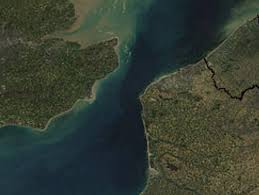记忆方法
1. canal channel.
中文词源
channel 海峡,沟渠
词源同cane, canal.
英语词源
- channel
-
channel: [13] Channel and canal are ultimately the same word. Their common ancestor was Latin canālis ‘groove, channel’, a derivative of canna ‘pipe’ (source of English cane). This passed into Old French as chanel, which English took over as channel. But then in the 15th century English acquired canal, either directly from Latin, or from French canal, which was itself remodelled on the Latin form – it is not clear which.
=> canal, cane - channel (v.)
- 1590s, "to wear channels in," from channel (n.). Meaning "convey in a channel" is from 1640s. Related: Channeled; channeling.
- channel (n.)
- early 14c., "bed of running water," from Old French chanel "bed of a waterway; tube, pipe, gutter," from Latin canalis "groove, channel, waterpipe" (see canal). Given a broader, figurative sense 1530s (of information, commerce, etc.); meaning "circuit for telegraph communication" (1848) probably led to that of "band of frequency for radio or TV signals" (1928).
English Channel is from 1825; the older name was British Channel (by 1730). John of Trevisa's Middle English translation of the encyclopedia De Proprietatibus Rerum (c. 1398) has frensshe see for "English Channel." The Channel Islands are the French Îles Anglo-Normandes.
权威例句
- 1. The series goes out at 10.30pm, Fridays, on Channel 4.
- 这部连续剧每周五晚上10点30分在第4频道播出。
- 2. She had heard the news-flash on a TV channel's news update.
- 她在一家电视台的新闻快讯中听到了这则简明新闻。
- 3. The Channel Tunnel project is the biggest civil engineering project in Europe.
- 英吉利海峡隧道是欧洲最大的土木工程。
- 4. Channel 4 arrived and somehow created a different role for television.
- 第四频道开播了,它在某种程度上为电视创造了一个不同的角色。
- 5. The Channel tunnel was due to open towards the end of 1993.
- 海峡隧道预计1993年年底前开通。

